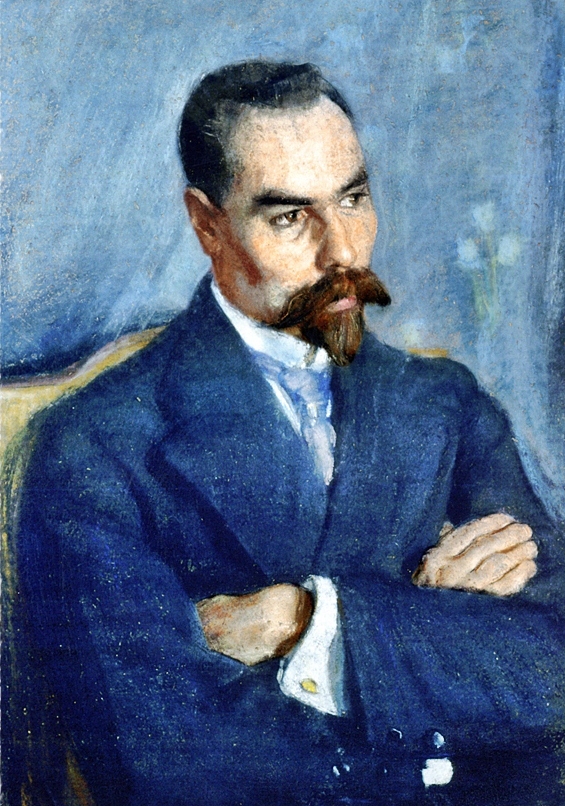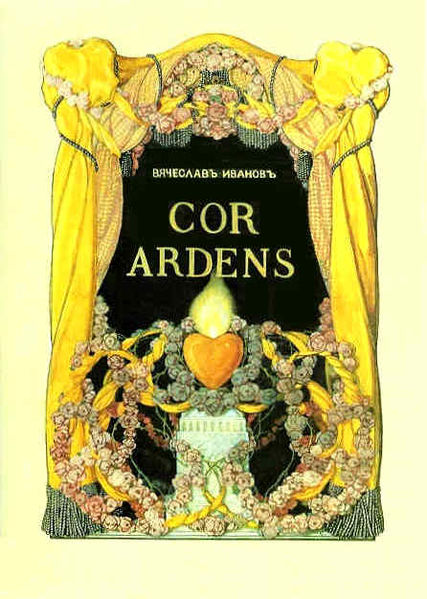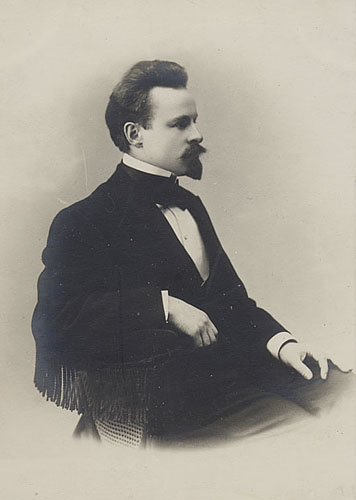|
Vesy
''Vesy'' (russian: Весы́; en, The Balance or The Scales) was a Russian symbolist magazine published in Moscow from 1904 to 1909, with the financial backing of philanthropist S. A. Polyakov. It was edited by the major symbolist writer Valery Bryusov. History Vesy was the leading literary magazine of the Russian symbolist movement. The first issue featured Bryusov's ''The Keys of Mysteries'', a major statement of symbolist doctrine. It reported on contemporary art and literature in Western Europe, and had many foreign correspondents. It was originally created as a magazine of criticism and information, but in 1906 it was expanded to include poetry and prose. Vesy published the works of all the major Russian symbolists, including Alexander Blok, Andrei Bely, Zinaida Gippius, Konstantin Balmont, Fyodor Sologub, Vyacheslav Ivanov, and those of Bryusov himself, along with the works of other major writers close to the symbolist movement, like Maximilian Voloshin and Mikhail Kuzmin. ... [...More Info...] [...Related Items...] OR: [Wikipedia] [Google] [Baidu] |
Zinaida Gippius
Zinaida Nikolayevna Gippius (Hippius) (; – 9 September 1945) was a Russian poet, playwright, novelist, editor and religious thinker, one of the major figures in Russian symbolism. The story of her marriage to Dmitry Merezhkovsky, which lasted 52 years, is described in her unfinished book ''Dmitry Merezhkovsky'' (Paris, 1951; Moscow, 1991). She began writing at an early age, and by the time she met Dmitry Merezhkovsky in 1888, she was already a published poet. The two were married in 1889. Gippius published her first book of poetry, '' Collection of Poems. 1889–1903'', in 1903, and her second collection, '' Collection of Poems. Book 2. 1903-1909'', in 1910. After the 1905 Revolution, the Merezhkovskys became critics of Tsarism; they spent several years abroad during this time, including trips for treatment of health issues. They denounced the 1917 October Revolution, seeing it as a cultural disaster, and in 1919 emigrated to Poland. After living in Poland they moved to France ... [...More Info...] [...Related Items...] OR: [Wikipedia] [Google] [Baidu] |
Valery Bryusov
Valery Yakovlevich Bryusov ( rus, Вале́рий Я́ковлевич Брю́сов, p=vɐˈlʲerʲɪj ˈjakəvlʲɪvʲɪdʑ ˈbrʲusəf, a=Valyeriy Yakovlyevich Bryusov.ru.vorb.oga; – 9 October 1924) was a Russian poet, prose writer, dramatist, translator, critic and historian. He was one of the principal members of the Russian Symbolist movement. Darko Suvin, "Bryusov,Valery" in Curtis C. Smith, '' Twentieth-Century Science-Fiction Writers''. Chicago, St. James, 1986. (pp. 840–41). Background Valery Bryusov was born on 13 December 1873 (1 December 1873 according to the old Julian calendar) into a merchant's family in Moscow. His parents were educated for their class and had some literary associations, but had little do with his upbringing, leaving the boy largely to himself. He spent a great deal of time reading "everything that fell into ishands", including the works of Charles Darwin and Jules Verne, as well as various materialistic and scientific essays. The ... [...More Info...] [...Related Items...] OR: [Wikipedia] [Google] [Baidu] |
Maximilian Voloshin
Maximilian Alexandrovich Kirienko-Voloshin (russian: Максимилиа́н Алекса́ндрович Кирие́нко-Воло́шин; May 28, Old_Style_and_New_Style_dates">O.S._May_16.html" ;"title="Old_Style_and_New_Style_dates.html" ;"title="nowiki/>Old Style and New Style dates">O.S. May 16">Old_Style_and_New_Style_dates.html" ;"title="nowiki/>Old Style and New Style dates">O.S. May 161877 – November 8, 1932), commonly known as Max Voloshin, was a Russian poet. He was one of the significant representatives of the Russian symbolism, symbolist movement in Russian culture and literature. He became famous as a poet and a literary criticism, critic of literature and the arts, being published in many contemporary magazines of the early 20th century, including ''Vesy'', ''Zolotoye runo'' ('The Golden Fleece'), and ''Apollon''. He was known for his translations of a number of French poetic and prose works into Russian. Biography Early life Voloshin was born in Kiev in 18 ... [...More Info...] [...Related Items...] OR: [Wikipedia] [Google] [Baidu] |
Vyacheslav Ivanov (poet)
Vyacheslav Ivanovich Ivanov (russian: Вячесла́в Ива́нович Ива́нов; – 16 July 1949) was a Russian poet and playwright associated with the Russian Symbolist movement. He was also a philosopher, translator, and literary critic. Early life Born in Moscow, Ivanov graduated from the First Moscow Gymnasium with a gold medal and entered the Moscow University where he studied history and philosophy under Sir Paul Vinogradoff. In 1886, he moved to the Berlin University to study Roman law and economics under Theodor Mommsen. During his stay in Germany, he absorbed the thoughts of Friedrich Nietzsche and German Romantics, notably Novalis and Friedrich Hölderlin. In 1886 Ivanov married Darya Mikhailovna Dmitrievskaya, the sister of his close childhood friend Aleksei Dmitrievsky. From 1892 he studied archaeology in Rome, completing his doctoral dissertation there. In 1893 he met Lydia Zinovieva-Annibal, a poet and translator. Having both received an Orthodox ... [...More Info...] [...Related Items...] OR: [Wikipedia] [Google] [Baidu] |
Konstantin Balmont
Konstantin Dmitriyevich Balmont ( rus, Константи́н Дми́триевич Бальмо́нт, p=kənstɐnʲˈtʲin ˈdmʲitrʲɪjɪvʲɪdʑ bɐlʲˈmont, a=Konstantin Dmitriyevich Bal'mont.ru.vorb.oga; – 23 December 1942) was a Russian symbolist poet and translator who became one of the major figures of the Silver Age of Russian Poetry. Balmont's early education came from his mother, who knew several foreign languages, was enthusiastic about literature and theater, and exerted a strong influence on her son. He then attended two gymnasiums, was expelled from the first for political activities, and graduated from the second. He started studying law at the Imperial Moscow University in 1886, but was quickly expelled (1887) for taking part in student unrest. He tried again at the Demidov Law College from 1889, but dropped out in 1890. In February 1889 he married Larisa Mikhailovna Garelina; unhappy in marriage, on 13 March 1890 Balmont attempted suicide by jumpi ... [...More Info...] [...Related Items...] OR: [Wikipedia] [Google] [Baidu] |
Mikhail Kuzmin
Mikhail Alekseevich Kuzmin (russian: Михаи́л Алексе́евич Кузми́н) ( – March 1, 1936) was a Russian poet, musician and novelist, a prominent contributor to the Silver Age of Russian Poetry. Biography Born into a noble family in Yaroslavl, Kuzmin grew up in St. Petersburg and studied music at the Saint Petersburg Conservatory under Nikolai Rimsky-Korsakov. He did not graduate, however, later explaining his move towards poetry thus: "It's easier and simpler. Poetry falls ready-made from the sky, like manna into the mouths of the Israelites in the desert." But he did not give up music; he composed the music for Meyerhold's famous 1906 production of Alexander Blok's play ''Balaganchik'' (The Fair Show Booth), and his songs were popular among the Petersburg elite: "He sang them, accompanying himself on the piano, first in various salons, including Ivanov's Tower, and then at The Stray Dog. Kuzmin liked to say of his work that 'it's only little music, but it h ... [...More Info...] [...Related Items...] OR: [Wikipedia] [Google] [Baidu] |
Andrei Bely
Boris Nikolaevich Bugaev ( rus, Бори́с Никола́евич Буга́ев, p=bɐˈrʲis nʲɪkɐˈlajɪvʲɪtɕ bʊˈɡajɪf, a=Boris Nikolayevich Bugayev.ru.vorb.oga), better known by the pen name Andrei Bely or Biely ( rus, Андре́й Бе́лый, p=ɐnˈdrʲej ˈbʲelɨj, a=Andryey Byelyy.ru.vorb.oga; – 8 January 1934), was a Russian novelist, Symbolist poet, theorist and literary critic. He was a committed anthroposophist and follower of Rudolf Steiner. His novel ''Petersburg'' (1913/1922) was regarded by Vladimir Nabokov as the third-greatest masterpiece of modernist literature. The Andrei Bely Prize (russian: Премия Андрея Белого), one of the most important prizes in Russian literature, was named after him. His poems were set to music and performed by Russian singer-songwriters. Life Boris Bugaev was born in Moscow, into a prominent intellectual family. His father, Nikolai Bugaev, was a noted mathematician who is regarded as a fo ... [...More Info...] [...Related Items...] OR: [Wikipedia] [Google] [Baidu] |
Fyodor Sologub
Fyodor Sologub (russian: Фёдор Сологу́б, born Fyodor Kuzmich Teternikov, russian: Фёдор Кузьми́ч Тете́рников, also known as Theodor Sologub; – 5 December 1927) was a Russian Symbolist poet, novelist, translator, playwright and essayist. He was the first writer to introduce the morbid, pessimistic elements characteristic of European ''fin de siècle'' literature and philosophy into Russian prose. Early life Sologub was born in St. Petersburg into the family of a poor tailor, Kuzma Afanasyevich Teternikov, who had been a serf in Poltava guberniya, the illegitimate son of a local landowner. When his father died of tuberculosis in 1867, his illiterate mother. Tatiana Semyonovna Teternikova, was forced to become a servant in the home of the aristocratic Agapov family, where Sologub and his younger sister Olga grew up. The family took an interest in the education of young Fyodor, sending him to a pedagogical institution where Sologub was a mode ... [...More Info...] [...Related Items...] OR: [Wikipedia] [Google] [Baidu] |
Alexander Blok
Alexander Alexandrovich Blok ( rus, Алекса́ндр Алекса́ндрович Бло́к, p=ɐlʲɪˈksandr ɐlʲɪˈksandrəvʲɪtɕ ˈblok, a=Ru-Alyeksandr Alyeksandrovich Blok.oga; 7 August 1921) was a Russian lyrical poet, writer, publicist, playwright, translator and literary critic. Early life Blok was born in Saint Petersburg, into an intellectual family of Alexander Lvovich Blok and Alexandra Andreevna Beketova. His father was a law professor in Warsaw, and his maternal grandfather, Andrey Beketov, was a famous botanist and the rector of Saint Petersburg State University. After his parents' separation, Blok lived with aristocratic relatives at the manor Shakhmatovo near Moscow, where he discovered the philosophy of Vladimir Solovyov, and the verse of then-obscure 19th-century poets, Fyodor Tyutchev and Afanasy Fet. These influences would affect his early publications, later collected in the book ''Ante Lucem''. Career and marriage In 1903 he married the actr ... [...More Info...] [...Related Items...] OR: [Wikipedia] [Google] [Baidu] |
Russian Symbolism
Russian symbolism was an intellectual and artistic movement predominant at the end of the 19th and beginning of the 20th century. It arose separately from European symbolism, emphasizing mysticism and ostranenie. Literature Influences Primary influences on the movement weren't merely western writers such as Brix Anthony Pace, Paul Verlaine, Maurice Maeterlinck, Stéphane Mallarmé, French symbolist and decadent poets (such as Stéphane Mallarmé, Paul Verlaine and Charles Baudelaire), Oscar Wilde, D'Annunzio, Joris-Karl Huysmans, the operas of Richard Wagner, the dramas of Henrik Ibsen or the broader philosophy of Arthur Schopenhauer and Friedrich Nietzsche. According to the experienced Belgian slavist Emmanuel Waegemans, "who was and still is indeed considered to be the expert par excellence in Russian literature and culture from the eighteenth-century onwards" Russian thinkers themselves contributed largely to this movement: such examples would be the irrationalistic and ... [...More Info...] [...Related Items...] OR: [Wikipedia] [Google] [Baidu] |
Moscow
Moscow ( , US chiefly ; rus, links=no, Москва, r=Moskva, p=mɐskˈva, a=Москва.ogg) is the capital and largest city of Russia. The city stands on the Moskva River in Central Russia, with a population estimated at 13.0 million residents within the city limits, over 17 million residents in the urban area, and over 21.5 million residents in the metropolitan area. The city covers an area of , while the urban area covers , and the metropolitan area covers over . Moscow is among the world's largest cities; being the most populous city entirely in Europe, the largest urban and metropolitan area in Europe, and the largest city by land area on the European continent. First documented in 1147, Moscow grew to become a prosperous and powerful city that served as the capital of the Grand Duchy that bears its name. When the Grand Duchy of Moscow evolved into the Tsardom of Russia, Moscow remained the political and economic center for most of the Tsardom's history. When ... [...More Info...] [...Related Items...] OR: [Wikipedia] [Google] [Baidu] |
Mir Iskusstva
''Mir iskusstva'' ( rus, «Мир искусства», p=ˈmʲir ɪˈskustvə, ''World of Art'') was a Russian magazine and the artistic movement it inspired and embodied, which was a major influence on the Russians who helped revolutionize European art during the first decade of the 20th century. The magazine had limited circulation outside Russia. From 1909, several of the ''miriskusniki'' (i.e., members of the movement) also participated in productions of Sergei Diaghilev's Ballets Russes company based in Paris. Foundation The artistic group was founded in November 1898 by a group of students that included Alexandre Benois, Konstantin Somov, Dmitry Filosofov, Léon Bakst, and Eugene Lansere. The starting moments for the new artistic group was organization of the ''Exhibition of Russian and Finnish Artists'' in the Stieglitz Museum of Applied Arts in Saint-Petersburg. The magazine was co-founded in 1899 in St. Petersburg by Alexandre Benois, Léon Bakst, and Sergei ... [...More Info...] [...Related Items...] OR: [Wikipedia] [Google] [Baidu] |







.jpg)